Every fall, those concerned about their health and immunity start searching for “immune-boosting foods.” A Google search will result in around 200,000 hits and you’ll see oodles of lists of foods that often include citrus, fish, yogurt, and spices. Many results highlight questionable remedies marketed as cold and flu-fighters. The truth is that there is no single food that will ensure that your body will work its best to fight off bacteria or viruses that you’re exposed to, but several recent studies are showing that the quality of your overall diet and lifestyle, along with specific nutrient-rich, immunity-boosting foods, can play a role in helping to bolster your body’s immune system for the upcoming cold weather season.
The immune system is a complex network of cells, tissues, and organs that identify a potential pathogen, such as bacteria, viruses, or fungi when it enters your body and takes steps to neutralize the threat. Many vitamins, minerals, and other bioactive compounds in foods play a role in the immune system.
According to research, the most essential nutrients for immunity include vitamins A (beta-carotene), B, C, D, E, folic acid and linoleic acid, copper, iron, selenium, and zinc. According to research, deficiencies in any of these nutrients may compromise your body’s ability to fend off pathogens.
To eat for improved immunity, the goal is to focus on a plant-centric diet, as most bioactive compounds that help keep the immune system functioning at its best are present in plant-based foods. A good rule of thumb is to strive for five to nine servings of fruits and vegetables every day. A serving of fruit is one medium piece of fresh fruit, one cup of berries, or 100% fruit juice, and a serving of vegetables is one cup of raw or cooked vegetables or 100% vegetable juice.
To help boost your immune system this fall and winter, here are 10 best immunity-boosting foods. Read on, and for more healthy eating tips, check out 23 High-Protein Snacks To Stay Full & Energized All Day.
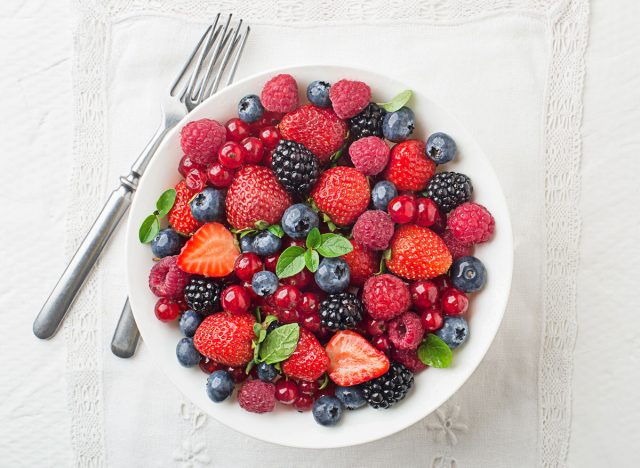

Whether you choose blueberries, strawberries, blackberries, or raspberries, all berries pack in vitamin C and an antioxidant punch to help keep your immune system strong, according to a review article published in the journal Molecules. The vivid red, blue, purple, and black-hued berries are a cue that they’re rich in beneficial anthocyanins. Many anthocyanins are potent antioxidants. According to research, these compounds provide numerous health benefits, including immune health.


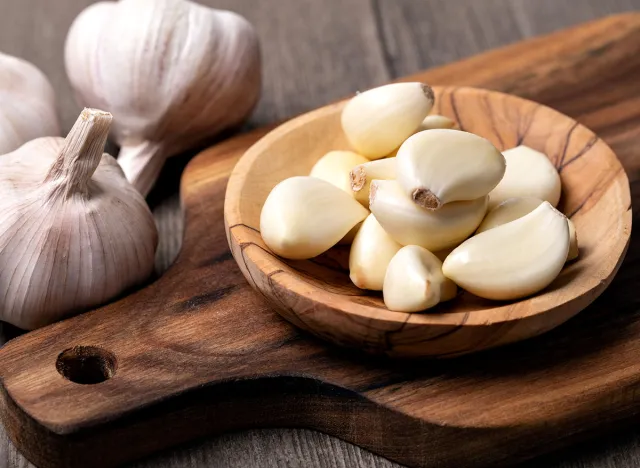

There are more than 5,000 published research articles about garlic and its role in immune function. According to the University of Rochester, alliin is the main bioactive compound in garlic, and alliin acts as an antibacterial agent. It also provides allicin, which acts as a natural antibiotic. Garlic has long been used as an antiseptic, antibacterial, and antifungal agent and it may boost the immune system to help ward off viruses and other pathogens.
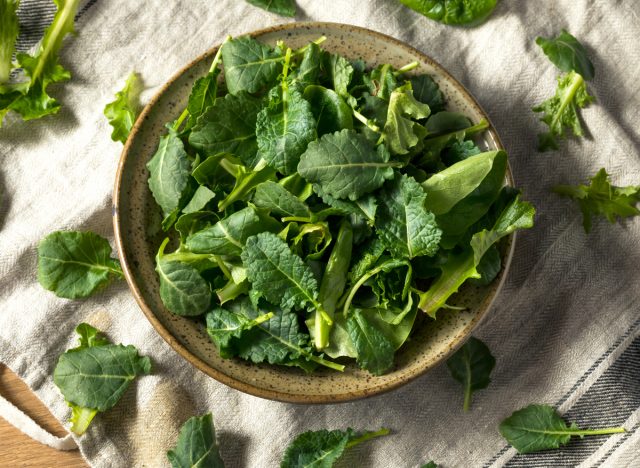

According to Phoenix-based registered dietitian Rhyan Geiger, RDN, greens like spinach, kale, arugula, and other leafy greens have vitamin C and antioxidants like beta carotene and are great for supporting your immune health. Leafy greens pack in several nutrients linked to improved immunity, including fiber for your gut’s health, vitamin C, beta-carotene, and hundreds of bioactive compounds. A study reported in the journal Nutrients reported that in Ikaria, Greece, one of the five “Blue Zones” in the world— which represent the healthiest areas on the planet—residents commonly enjoyed bitter greens as part of their daily diets.
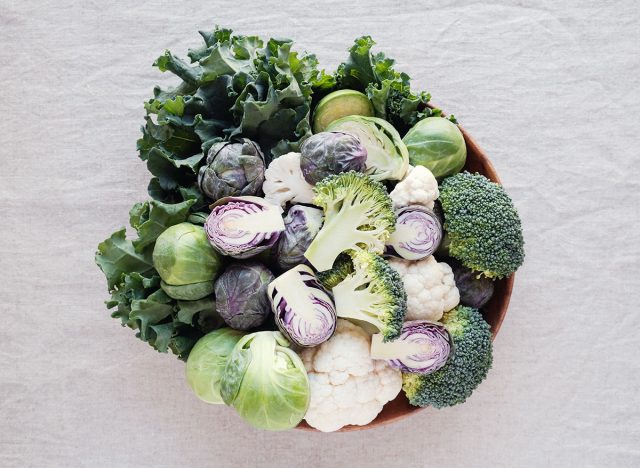

These popular cruciferous veggies provide unique bioactives that can directly improve your immunity. According to a study in the journal Cell, cruciferous vegetables have a direct impact on the chemical signal that triggers intra-epithelial lymphocytes, an important class of immune cells that serve as a first line of defense against pathogens. The researchers reported that in an animal model study when animals were deprived of cruciferous vegetables in their diet, some 70-80% of these protective cells disappeared.
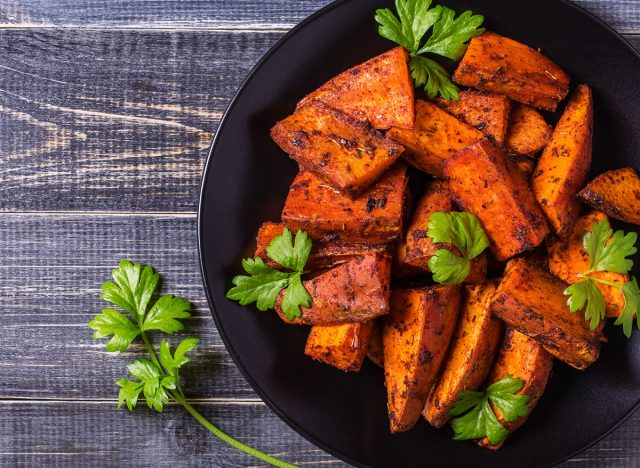

The vivid orangey-hue flesh of sweet potatoes reflects the antioxidant content of this nutritious root vegetable, explains registered dietitian Sarah Schlichter, MPH, RDN. The antioxidants are not only great for overall health, but they also play a role in bolstering the body’s immune defenses.
“A medium sweet potato provides more than 100% of the vitamin A (in the form of beta-carotene) that you need in an entire day.” One study reported that sweet potatoes could be a way to prevent vitamin A deficiencies. What’s more, sweet potatoes pack in about 40% of your daily vitamin C requirement, and they also contain fiber, potassium, and magnesium. For a quick addition to your diet, microwave a sweet potato and enjoy them mashed. Mashed sweet potato can be enjoyed as a side item or incorporated into smoothies, baked goods, and soups.
READ RELATED: Virus Experts Issue New Guidance as RSV, COVID, and Flu Cases Rise


Citrus is one of the best sources of vitamin C, folate, and hundreds of other beneficial bioactive components that can help bolster your immune system. According to research published in Frontiers in Immunology, citrus fruit helps tamp down oxidative stress to control systemic inflammation. The vitamin C and folate support the function of many types of immune cells, including natural killer cells and T-cells. What’s more, several of the main bioactive components present in citrus, like hesperidin, naringenin, naringin, and narirutin, all possess anti-inflammatory benefits.


Almonds are often promoted as an immune-boosting food, and that’s because they are a tree nut rich in vitamin E. Almonds are nutrient-packed and provide 4 grams of fiber, healthy unsaturated fat, 6 grams of plant-based protein, magnesium, selenium, copper, zinc, and vitamin E.
Almonds contain the most vitamin E of any nut, and vitamin E has been shown in studies to help increase T-cells, which are the immune system cells that can neutralize pathogens. What’s more, other studies show that almonds also improve the gut microbiota, which also bolsters immunity.
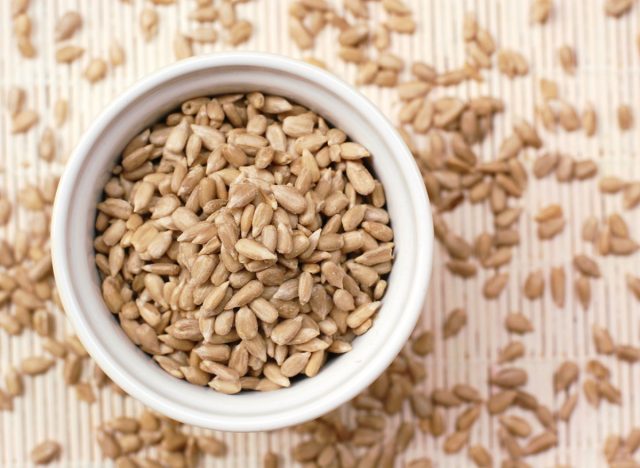

Cough and cold medications often have added selenium. That’s because selenium boosts white blood cells, which can enhance the body’s ability to fight off infections. Eating nutritious foods rich in selenium is one way to keep your immune system primed. One study published in Advances in Nutrition reported on how selenium promotes a cellular immune response. The authors suggest that dietary selenium may be considered as an adjunct therapy along with traditional medications when fighting infections.
Pumpkin, sesame, hemp, and other seeds are also rich in B vitamins, fiber, and zinc, nutrients that are essential for fending off bacteria, viruses, and fungi.
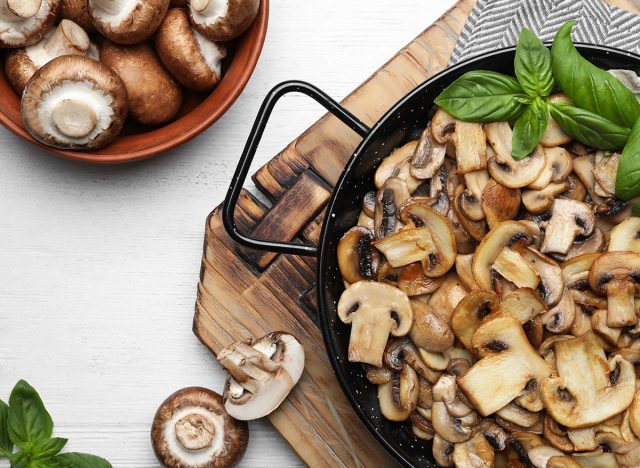

If you Google mushrooms and immunity, you’ll get nearly 6 million results. The use of mushrooms to protect against various infectious diseases dates back thousands of years to early Chinese, Egyptian, Greek, and Roman cultures. Mushrooms provide several key nutrients that support a healthy immune system, including selenium, Vitamin D, and B6.
According to the National Institutes of Health, your immune system needs vitamin D to fend off bacteria and viruses. Mushrooms are the only food in the produce section to feature vitamin D. All mushrooms contain some amount of vitamin D. Still, UV-exposed mushrooms are the only produce item with 50-128% of naturally occurring vitamin D.
For example, a portabella mushroom contains 120% of the RDA for vitamin D. Enjoy mushrooms in salads, with eggs, or chop and use them blended with ground meat to create healthier, immune-boosting meals.
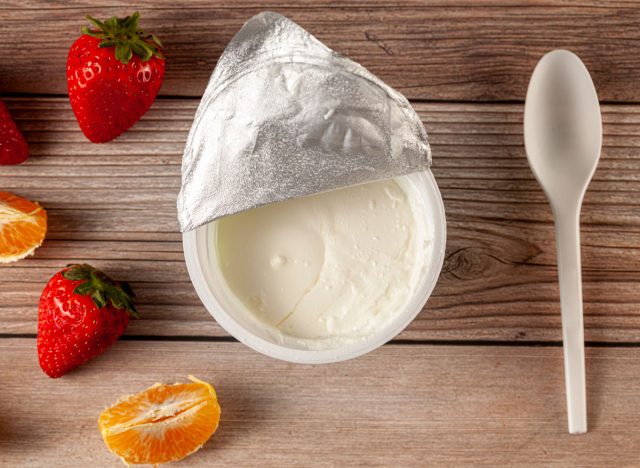

Yogurt is considered an immune booster because yogurt provides “live and active cultures,” which help improve your gut microbiota. Your GI tract cells are considered a first line of defense against pathogens that enter your body. The GI tract also has specialized immune cells that aid in neutralizing pathogens that may have been consumed.
According to a review article published in the Journal of Applied Microbiology, probiotics are usually defined as microbial food supplements with beneficial effects on consumers. Most probiotics in the US diet come from yogurt, kefir, or other fermented foods. Some of the beneficial effects of lactic acid bacteria include improving intestinal tract health, enhancing the immune system, increasing the absorption of certain nutrients, and reducing the risk for certain cancers, among other health benefits.









